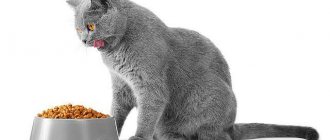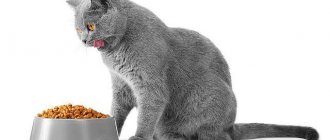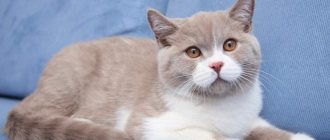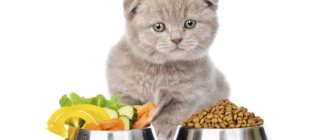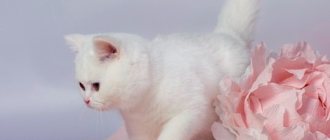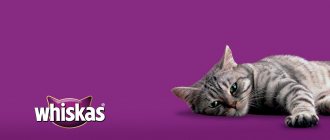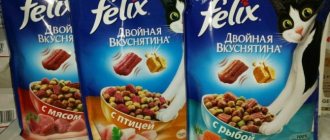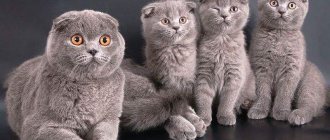British is an artificially bred breed. Not all foods that are fed to barn cats are suitable for her. The health and longevity of the pet depends on how responsibly the owner approaches the preparation of the diet. And for kittens, proper nutrition is doubly important. Therefore, when it comes to feeding, recommendations from veterinarians and experienced breeders of British cats will not hurt.
Choosing a place and utensils for feeding
A British cat should have a separate place for eating. Important terms:
- safety;
- comfort;
- privacy;
- availability.
You should not feed your Briton in a hallway where people often walk, or in a room with a TV constantly on. Extraneous noise will distract the cat.
For your information. If there is already a pet in the apartment, it is better to feed the kitten separately at first. Otherwise, the older pet may take the food away from him.
British cats are best fed from deep stainless steel or ceramic bowls. The dish should be wide enough so that the mustache does not rest against the sides. After each feeding, the bowls are washed, and the area where the cat ate is wiped with a damp cloth. You can put oilcloth or a rubber mat there - this will greatly simplify cleaning.
Natural diet
Many owners prefer to feed their British cat natural food at home. It is believed that this is the most physiological type of nutrition. Cats are carnivores by nature, so their diet must include meat and other products that are available to animals in the wild.
What foods should be given?
The basis of the diet (60-70%) of British shorthair and longhair cats is made up of lean meats - beef, chicken, turkey. Lamb, pork, geese and duck meat are too fatty, so they should not be fed to pets.
About 2 times a week the menu includes offal:
- boiled liver;
- heart;
- kidneys;
- lungs;
- language;
- chicken stomachs.
They provide the body with amino acids and add variety to the daily menu.
Another important component of the diet (25-30%) is vegetables, fruits and herbs. These are sources of vitamins, minerals and dietary fiber.
It is useful to feed British cats:
- carrots;
- cucumbers;
- asparagus;
- pumpkin;
- zucchini;
- apples;
- apricots;
- sprouted oats;
- lettuce leaves;
- dill
Vegetables and herbs are given in the form of salads or mixed into meat. Fruits can act as treats.
Once every 3-4 days, British cats are fed boiled sea fish. It must be cleaned of bones and scales.
At home, British cats are also fed fermented milk products: low-fat kefir, cottage cheese, curdled milk, natural yogurt. Once a week they pamper you with grated cheese.
Important. Only kittens can be given milk. It is usually not absorbed by adult cats.
To provide your pet with additional energy, the menu includes rice and buckwheat porridge. They account for 5-10% of the total food volume.
British cats are fed chicken or quail eggs 2-3 times a week. These products do not need to be boiled if the owner is sure that they are not contaminated with pathogenic bacteria.
It is preferable to use only the yolk. It is given separately or mixed with fermented milk products.
For your information. If you feed your British cat correctly, she will have a shiny coat, clear skin and clear eyes.
Rules and regulations for preparing natural food
If you feed a British cat natural food, you should adhere to the following rules:
- British cats are fed only fresh food. You can freeze a few portions for an emergency, but you can’t use this method all the time.
- Meat can be given raw, but first it must be scalded with boiling water or frozen for 2-3 days. This is necessary to destroy parasites.
- The British are fed thick food at room temperature. If the food was in the refrigerator, it must be reheated.
- Vegetables, meat and fish are not mixed with fermented milk products.
- Meat is given along with vegetables and herbs.
The daily feeding rate for British breed cats is about 5% of their weight, or 40-60 g of food per 1 kg of weight. The serving size is adjusted according to the age, activity level and individual characteristics of the animal.
Important. British cats are prone to obesity - they should not be overfed.
Primary requirements
Every cat owner should remember that your pet is one hundred percent a predator. This is where cats differ from dogs - over thousands of years of domestication, dogs have learned to eat the same food that their owner eats, but cats still require meat in order to grow and develop normally.
British babies are no exception in this regard. The basis of their diet should be meat . It is recommended to feed a British cat beef products. This meat is easily digested by your furry pet's delicate stomach.
It is best to feed cooked meat, as raw ground beef may contain parasitic larvae that are dangerous not only to cattle, but also to predators.
© shutterstock
Ready-made feed
Many owners prefer to give their Britons dry food and wet canned food - it’s convenient and simple. But the products must be of high quality - not lower than premium.
It is better to avoid buying cheap food from the nearest supermarket. Economy class food contains practically no natural meat. But they contain ballast substances, dyes, flavors and other harmful components.
You should carefully study the composition of the feed. Meat should come first. Good products contain vitamins, minerals and amino acids that support the health and strengthen the immune system of the British cat. A minimum of carbohydrates is encouraged - they lead to weight gain.
Selection of industrial feed
Owners of British cats consider the following brands to be the best food:
- Earthborn Holistic;
- Go! Natural Holistic;
- Bosch Sanabelle Grande;
- Acana;
- Orijen;
- Eukanuba;
- Eagle Pac Cat Holistic;
- 1st Choice.
This is a super premium class and holistic food. They are quite expensive, but their composition fully satisfies the needs of the cat's body.
If your budget is limited, you can purchase premium food for the British:
- Purina Pro Plan;
- Brit Premium;
- RoyalCanin;
- Hill's.
The Royal Canin company produces a special food for British kittens that can be fed to babies aged 4 to 12 months - British Shorthair Kitten. It is highly digestible and contains prebiotics that support the functioning of the gastrointestinal tract.
Royal Canin produces British Shorthair Adult food for adult cats. It helps Britons maintain muscle mass. Omega-3 fatty acids strengthen joints and maintain their mobility.
For kittens, pregnant, lactating, spayed, neutered, elderly cats or pets with any diseases, buy food from specialized lines. All well-known manufacturers have such names.
Before choosing food for your British cat, it is better to consult a veterinarian. He will give individual nutritional recommendations.
Using dry food for feeding
If the owner of a British cat decides to feed his cat dry food, then he must understand that it is important to choose its composition and manufacturer. First of all, preference should be given to Premium class food. It is also important that the four-legged family member likes him. The British are very picky when it comes to food . Therefore, there is no point in buying large packages of food, even if it is the best on the pet store counter. To begin with, you should select several varieties in economical packages and see what the cat likes.
Also, when choosing the right type of dry food, it is important that it is available for sale, that is, you do not need to look for it in different stores in the city. Once the food has been selected, it is not recommended to change it to other varieties. The cat's body gets used to one food, and it is very difficult for a cat to adapt to another type of feeding. If a domestic cat eats dry food, it is important to ensure that there is always a container of clean and fresh water near the bowl.
Mixed feeding
Breeders and felinologists do not recommend feeding the British cats both natural food and industrial food. This is fraught with problems with digestion and urination. In addition, it will be difficult for an inexperienced owner to balance the diet and calculate its calorie content.
Sometimes a British cat can still be given different types of food, but this needs to be done at different feedings. For example, offer your pet dry kibble in the morning and meat in the evening. But it is not recommended to practice this method constantly.
Algorithm for switching to a different diet
A British cat cannot be suddenly switched from dry food to natural food, and vice versa. Sudden changes in diet disrupt the functioning of the digestive system.
New food is introduced gradually over 10-14 days. First, 25-30% of the usual food is replaced, and the rest of the food is left the same.
After 2-3 days, the proportion of unfamiliar food is increased by another 10-15%. This is done until the British cat completely switches to the new diet.
During the process, the condition of the animal is closely monitored. If allergies, indigestion or other negative reactions appear, return to the usual menu. In such situations, the cat is taken to the veterinarian so that a specialist can help choose the appropriate diet.
Often British people refuse to eat natural food after ready-made food. In this case, you can give your cat a fasting day. Most likely, when she gets hungry, she will eat whatever her owner offers.
Vitamins and mineral supplements
If a British cat is fed natural products, vitamin and mineral complexes must be included in the diet. Many owners use natural supplements:
- Brewer's yeast;
- bone meal;
- fish fat.
The dosage appropriate for a particular pet is determined by the veterinarian.
A couple of times a year, it is beneficial for British cats to drink complex industrial supplements. They are used in courses of 1-3 months. Continuous use is fraught with health problems.
The following brands of vitamins have proven themselves to be effective:
- 8 in 1;
- Kitzyme;
- Gimpet;
- Omega Neo;
- Sanal;
- Veda Biorhythm;
- Canina.
There are also drugs on sale to eliminate problems with hair, internal organs, etc.
Water in the diet
British cats should always have access to clean water. It is renewed 1-2 times a day - aristocratic Englishmen often refuse to drink stale liquid.
Water is especially necessary if the cat is fed dry kibble. They are dehydrated, so the pet drinks 2-3 times more than when eating natural food.
It is not recommended to give tap water to animals. It contains chlorine and other harmful impurities. Therefore, it is pre-filtered and settled. Some owners buy bottled water. Naturally, without gas.
Important. If a British cat drinks little, she may develop urolithiasis. This pathology especially often appears after castration.
How to distinguish long hair from obesity
The length of the coat for the Scottish Fold breed is not standardized. And it is important not to confuse what exactly we are dealing with: thick hair or obesity. The first case is illustrated by photo 1.
Long wool
Obesity
Signs of incipient obesity can be seen in photo 2. In an advanced stage, the fat would hang in folds.
All the breeds discussed here cannot be recommended for beginners. Each of them is characterized by difficulties associated with nutrition and care.
What to feed a British kitten
For the first month after birth, a Briton feeds exclusively on mother's milk. It provides babies with all the necessary substances and promotes the formation of strong immunity.
If there is no mother, British kittens should be fed with cat milk substitutes, which are sold in veterinary pharmacies. It is not recommended to give baby food. It is designed for people, not animals.
A one-month-old kitten begins to be fed breast milk in the intervals between meals. The baby is carefully introduced to solid food so that at 2-3 months he is ready to move to a new home.
For your information. The British Fold kitten, which is usually a mix with the Scottish Fold, is fed the same as a straight-eared kitten.
An approximate feeding schedule for a British kitten by age is presented in the table.
| Age | Number of feedings per day | Diet |
| British kittens: 1 month | 3-5 | · small pieces of beef; · porridge with milk; milk for kittens |
| British kitten: 2 months | 6-8 | · small pieces of beef; · low-fat cottage cheese; · porridge with milk; milk for kittens |
| British kitten: 3 months | 6 | from three months, chicken, vegetables and egg yolk are introduced into the diet, and milk for kittens is replaced with goat or cow milk; other products remain unchanged: pieces of beef; · porridge with milk; · low-fat cottage cheese |
| British kitten: 4-6 months | 5 | A British kitten at 4 months is gradually weaned off whole milk and switched to fermented milk products, the diet is enriched with: · offal; · boiled sea fish; · fruits |
| British kitten: 6-10 months | 3-4 | · all types of lean meat; by-products; · porridge; · vegetables, fruits, herbs; · dairy products; · eggs; boiled sea fish |
From 10-12 months, British kittens are fed twice a day. Now they eat the same foods as adult cats.
An alternative option is to use ready-made feed. Canned food and dry granules can be given to a small kitten of two months. The “drying” is soaked in water or milk so that the baby can chew it.
Gradually increase the proportion of dry food in the diet and reduce the amount of wet food:
- British: 3 months – 90% wet/10% dry;
- British: 4-6 months – 70-80% wet / 20-30% dry;
- British: 6-10 months – 60-70% wet / 30-40% dry;
- British: 10-12 months – 50-60% wet / 40-50% dry.
From the age of one year, the pet is given 30% wet food and 70% dry food. It is desirable that the products are from the same manufacturer. This minimizes the risk of digestive problems and allergic reactions.
The daily feeding rate for a British kitten is about 10% of its weight. When feeding dry food, follow the manufacturer's recommendations.
Safety
You need to continue feeding your pet the same types of meat. For safety, it is recommended to boil it. It is not recommended to feed your British cat raw minced meat (this is especially dangerous for veal). If you dare to give your kitten raw meat, it is better to keep it frozen and pour boiling water over it before feeding your pet.
© shutterstock
Vegetables should also be a mandatory element in the diet. It is best to give them at lunchtime along with meat and rice porridge with milk. Otherwise, milk can be excluded from the diet, since at this age the pet’s body has almost no need for dairy products.
You can give your kitten fermented milk products, because it makes your pet’s coat healthier, stronger, silkier and smoother.
Nutrition at five months of age
Time has flown by, and now a real aristocrat is already living in your house. British adults tend to be very fussy when it comes to food. Your pet already chooses what to eat and what not to eat. Pay close attention to what your pet likes most. But you should still give your pet the freedom to choose his own food - this way you can seriously spoil him. You need to maintain a healthy diet.
The British really have a very capricious stomach , which does not accept any food. For example, milk can no longer be given, since it is very difficult to digest in the stomach of an adult animal.
Feeding an older cat
With age, British cats become less active, and metabolic processes in their bodies slow down. To prevent them from gaining weight, the caloric content of their diet is reduced.
The British cat is fed small meals 3-4 times a day so as not to overload the digestive system.
To improve intestinal function, some meat is replaced with vegetables. They contain fiber, which stimulates the gastrointestinal tract.
You need to carefully ensure that your pet consumes enough fluid. Many owners install drinking fountains. It has been noticed that cats drink from them more willingly.
When fed commercial food, an aging pet is switched to products from lines for older cats. If dental problems appear, the cat is given more canned food and pates, which are easier to chew.
If any illness occurs, veterinarians prescribe a special diet for the British.
Features of British cats
One of the most common cat breeds today is the British cat.
This popularity is due to the gentle, patient character, high learning ability and stunning external beauty of this breed. However, no matter how easy British cats are to train and communicate with, they require special care and are extremely selective in food. Our article will tell you how to choose food for a British cat, how many servings should be given, what mistakes should be avoided and how to create the ideal menu for your pet. The greatest number of mistakes are made by owners when feeding the cat. Any violations of the diet entail severe obesity, to which absolutely all “Britons” are prone. Of course, fat cats have a certain charm and look cute in their own way, however, excess weight entails rapid wear and tear of the cardiovascular, renal, and musculoskeletal systems and a shortening of the pet’s lifespan.
For each period of development of a British cat there are separate care recommendations, following which you can please the fastidious taste of the breed and raise a healthy, active and strong pet.
You can buy the best food for British cats in Irkutsk at the best prices using our service.
Prohibited Products
Most foods that people eat are not suitable for cats. The British should not be fed any salty, sweet, fried, fatty, smoked, or spicy foods. The cat's body is not adapted to digest such food, and the liver cannot cope with large amounts of toxic substances.
Also, the food of British cats should not include the following foods:
- River fish;
- tubular bones;
- sausages;
- semi-finished products, canned food and fast food;
- mayonnaise, ketchup and other sauces;
- chocolate, cocoa;
- eggplants, potatoes, legumes;
- mushrooms;
- citrus fruits, grapes, raisins;
- rhubarb, sorrel, onion, garlic;
- foods and drinks that contain alcohol, caffeine and other stimulants.
A British cat should not be fed food from the human table, even if it plaintively begs for a tidbit. Such handouts will result in serious health problems.

